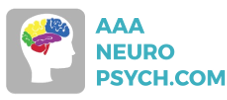Clinical Assessment
We can provide careful and thorough neuropsychological and psychological evaluations to help with treatment planning.
Neuropsych Assessment
A neuropsychological assessment involves specialized tests to evaluate “brain functions” like memory and thinking. It helps with understanding how the different areas and systems of the brain work and how they impact daily functioning. The detailed assessment helps to identify a person’s pattern of strengths and weaknesses. It can also evaluate mood, personality, coping skills and the impact of psychosocial and cultural influences. These evaluations help with coming up with a diagnosis to help with treatment planning.
What Conditions
The following are some of the conditions that affect brain-behavior relationships which can be evaluated in a neuropsychological evaluation or psychological evaluation:
Neurological/Other Medical Conditions:
“Memory Loss”
Traumatic brain injuries or concussions
Dementia (e.g. Alzheimer’s, Vascular)
Movement disorders (e.g. Parkinson’s)
Strokes or “mini strokes (TIAs)”
Brain tumors
Multiple sclerosis
Epilepsy or seizures
Genetic disorders
Metabolic disorders (e.g. diabetes, thyroid)
Developmental conditions:
Learning disabilities
Attention-deficit/hyperactivity disorder (ADHD)
Intellectual disabilities
Communication disorders
Other neurodevelopmental disorders
Neuropsychiatric Conditions:
Depression
Anxiety
Substance-Related Problems
Bipolar disorder
Schizophrenia or psychosis
Trauma (e.g. PTSD) or stressor related issues
Obsessive-compulsive disorders
Impulse Control Disorders
Personality Disorders
Other Psychosocial Issues
Relationship issues
Grief
Abuse or Violence
Social Justice Inequalities
Immigration or Acculturation Stress
Language Barriers
Socioeconomical Hardships
How Does It Help?
Early diagnosis and intervention is key for the best outcomes. Test results can help with proper diagnosis and with differentiating among different conditions. For instance, testing can help differentiate between early signs of dementia or stroke or depression. Testing can also help with identifying a disorder (e.g. ADHD, anxiety) that may be interfering with someone’s ability to function at their best at school, work or at home.
Neuropsychological evaluations can be sensitive to information about the brain that is not provided by other diagnostic testing procedures such as a CT scan or MRI. The procedures are sensitive to functions of specific brain areas important in day-to-day functioning.
Testing can also help with planning for assistance or needs in everyday life. For instance, test results can guide how to progress to the most independent level of functioning by maximizing strengths and minimizing weaknesses.
Sometimes testing is used to establish a “baseline” or to document a person’s abilities before there is any problem, so that later changes can be monitored carefully.
Results can help doctors with medication management and treatment planning. For instance, they can be used to document the functional effects of medical interventions such as introduction of medications, changes in medications or neurosurgical procedures.
Remediation efforts can focus on regaining lost skills and on learning ways to compensate for abilities that have been permanently changed because of an acquired injury, a degenerative process, or longstanding cognitive difficulties. Most individuals respond best to tailored programs tailored for their backgrounds and interests.
What happens in a neuropsychological assessment?
A comprehensive neuropsychological evaluations can take between 2-8 hours, with breaks as needed. Test batteries of differing lengths are used in our assessments depending upon the referral question.
1. Clinical Interview: The evaluation begins with a 1 hour clinical interview with a neuropsychologist that covers background and history. Family members typically participate in this meeting. Relevant medical records (e.g. CT/MRI results, reports from previous evaluations) can be helpful to provide at this time or may be sent prior to the appointment.
2. Testing and Evaluation: The next step involves working across the table to complete select paper-pencil or basic computer tests. These standardized tests typically evaluate the following aspects of “brain function”:
Global cognitive functioning (e.g. IQ)
Attention and “executive functions” (e.g. reasoning, problem solving)
Learning and memory
Language
Visual spatial skills (e.g. perception)
Motor and sensory skills
Judgement
Emotions and personality
After the evaluation is complete, the neuropsychologist examines the scores and compares them to sets of “normal” scores from healthy people who are matched for age, gender, education and ethnicity (if available). This allows the neuropsychologist to judge whether the scores are “normal” and whether there have been any changes in brain functioning that could account for the presenting concerns. Comparisons are also made with person’s own ability level to identify unique patterns of strengths and weaknesses. The role of any psychosocial influences are also carefully considered.
3. Feedback and Report: A feedback session can be scheduled 2-3 weeks after the testing is complete. During this session, the neuropsychologist discusses the detailed, written report that incorporates the presenting concerns, background information, test results, impressions, and helpful recommendations for families, doctors or other referral sources. The report is confidential and only released to those who are authorized to receive it.
4. Follow-up treatment: We may be able to provide psychological follow-up care including psychotherapy or cognitive remediations depending on our availability. We will make tailored referrals and recommendations based on our evaluation results.
Forms
This paperwork is for Clinical evaluations only. Please email your completed intake forms to info@aaaneuropsych.com. Completed paperwork must be received before your intake appointment.
Adult (age 21+) Intake Forms
Adolescent (age 20 and younger) Intake Forms
